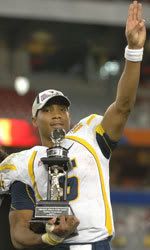Post by rainman on Sept 22, 2007 6:08:08 GMT -5
Injured Dykes important on Mountaineer defense against Terps
By Bob Hertzel
For the Times West Virginian
MORGANTOWN— It was Mark Twain who once noted that “there are lies, damned lies and statistics,” a statement that was born out last Thursday night when the statistics sheet showed that West Virginia’s nose tackle Keilen Dykes was credited with but one tackle in the game.
If you looked at that you would say he didn’t do much, and that would be a lie.
You might go so far as to say he wasn’t very important on the day the defense had its finest moments, and that would be a damned lie.
If you ask Rich Rodriguez, who just happens to coach the unbeaten and No. 5-ranked Mountaineers, you might learn that no one — NO ONE! — was more important to the defense on Thursday than Dykes.
And that goes for any other day the Mountaineers have a game.
“He’s as important a guy as we have there. He’s our 300-pounder in the middle. You play an odd defense and you have to be strong up the middle,” said Rodriguez.
And Dykes is strong … and big … and inspirational.
It was the inspirational part of it that stood tallest in the Maryland game. Dykes was uncertain as a participant right up until game time due to a foot injury.
But, when play began, there he was, ready to go.
“Seeing him out there was like seeing Willis Reed in there for the Knicks in the NBA playoffs,” said another Reed, WVU linebacker Reed Williams.
Reed Williams, of course, is far too young to remember the circumstances surrounding Willis Reed’s heroics in the 1970 NBA playoff finals. It was Game 7, the New York Knicks and the Los Angeles Lakers. Reed was down with a torn thigh muscle; he could not even go through pre-game warm-ups.
Then, just before the tipoff, after taking a couple of cortisone shots, Reed limped out onto the court to a thunderous ovation. For 27 minutes he bodied up with Wilt Chamberlain, forcing him farther and farther from the basket.
The Knicks defense stood tall, beating the Lakers, 113-99, for the title.
Reed scored only four points, but to say he had little effect would be a lie. In fact, it would be a damned lie.
“I didn’t think I could walk out there,” he said later. “But this was the championship. I had to do what I could.”
And so it was with Dykes, on a smaller stage and with a bit less at stake.
When Dykes was asked if he like Willis Reed, he laughed a hearty laugh.
“Nah, we got enough guys who could come off the bench and do the job, so I didn’t feel like Willis Reed,” he said.
Asked to explain what the injury is, Dykes was at a loss for words, a rare occurrence for the most gregarious of Mountaineers.
“I don’t know how to break it down for you. You have to get Dave’s analysis on that,” he said, referring to trainer Dave Kerns. “It’s something about a hot spot on the foot. It’s something about it being easy to fracture now or something like that, so I’m just taking it easy on it.”
To get him ready to play they almost had to put in an emergency call to a doctor … Dr. Scholl.
“They put like a sheet metal in my shoe, something crazy like that. They wrap it up tight and I can’t bend my foot too much,” he said.
Still, there was pain, enough to make it seem as if there were no way he could play.
That’s when defensive line coach Bill Kirelawich came and sat beside him.
“You know,” Kirelawich said, “you’ve played 33 straight games.”
“I have?” said Dykes.
“Yep,” said Kirelawich. “You gonna let that end here in the locker room ?”
“I’ll see what I can do,” Dykes said. “I went out there. It felt good enough, so I played.”
And that was all anyone needed to see on the defensive side of the ball. On Saturday, another decision will have to be made. Will Dykes play or will he give it some rest in hopes of allowing him to get through the rest of the year?
Ask him and this is what you get:
“I’ll be out there. I’ll be playing. Shoot, I ain’t got nothing else to do on Saturday.”
By Bob Hertzel
For the Times West Virginian
MORGANTOWN— It was Mark Twain who once noted that “there are lies, damned lies and statistics,” a statement that was born out last Thursday night when the statistics sheet showed that West Virginia’s nose tackle Keilen Dykes was credited with but one tackle in the game.
If you looked at that you would say he didn’t do much, and that would be a lie.
You might go so far as to say he wasn’t very important on the day the defense had its finest moments, and that would be a damned lie.
If you ask Rich Rodriguez, who just happens to coach the unbeaten and No. 5-ranked Mountaineers, you might learn that no one — NO ONE! — was more important to the defense on Thursday than Dykes.
And that goes for any other day the Mountaineers have a game.
“He’s as important a guy as we have there. He’s our 300-pounder in the middle. You play an odd defense and you have to be strong up the middle,” said Rodriguez.
And Dykes is strong … and big … and inspirational.
It was the inspirational part of it that stood tallest in the Maryland game. Dykes was uncertain as a participant right up until game time due to a foot injury.
But, when play began, there he was, ready to go.
“Seeing him out there was like seeing Willis Reed in there for the Knicks in the NBA playoffs,” said another Reed, WVU linebacker Reed Williams.
Reed Williams, of course, is far too young to remember the circumstances surrounding Willis Reed’s heroics in the 1970 NBA playoff finals. It was Game 7, the New York Knicks and the Los Angeles Lakers. Reed was down with a torn thigh muscle; he could not even go through pre-game warm-ups.
Then, just before the tipoff, after taking a couple of cortisone shots, Reed limped out onto the court to a thunderous ovation. For 27 minutes he bodied up with Wilt Chamberlain, forcing him farther and farther from the basket.
The Knicks defense stood tall, beating the Lakers, 113-99, for the title.
Reed scored only four points, but to say he had little effect would be a lie. In fact, it would be a damned lie.
“I didn’t think I could walk out there,” he said later. “But this was the championship. I had to do what I could.”
And so it was with Dykes, on a smaller stage and with a bit less at stake.
When Dykes was asked if he like Willis Reed, he laughed a hearty laugh.
“Nah, we got enough guys who could come off the bench and do the job, so I didn’t feel like Willis Reed,” he said.
Asked to explain what the injury is, Dykes was at a loss for words, a rare occurrence for the most gregarious of Mountaineers.
“I don’t know how to break it down for you. You have to get Dave’s analysis on that,” he said, referring to trainer Dave Kerns. “It’s something about a hot spot on the foot. It’s something about it being easy to fracture now or something like that, so I’m just taking it easy on it.”
To get him ready to play they almost had to put in an emergency call to a doctor … Dr. Scholl.
“They put like a sheet metal in my shoe, something crazy like that. They wrap it up tight and I can’t bend my foot too much,” he said.
Still, there was pain, enough to make it seem as if there were no way he could play.
That’s when defensive line coach Bill Kirelawich came and sat beside him.
“You know,” Kirelawich said, “you’ve played 33 straight games.”
“I have?” said Dykes.
“Yep,” said Kirelawich. “You gonna let that end here in the locker room ?”
“I’ll see what I can do,” Dykes said. “I went out there. It felt good enough, so I played.”
And that was all anyone needed to see on the defensive side of the ball. On Saturday, another decision will have to be made. Will Dykes play or will he give it some rest in hopes of allowing him to get through the rest of the year?
Ask him and this is what you get:
“I’ll be out there. I’ll be playing. Shoot, I ain’t got nothing else to do on Saturday.”




 Pitt!!!!!
Pitt!!!!!